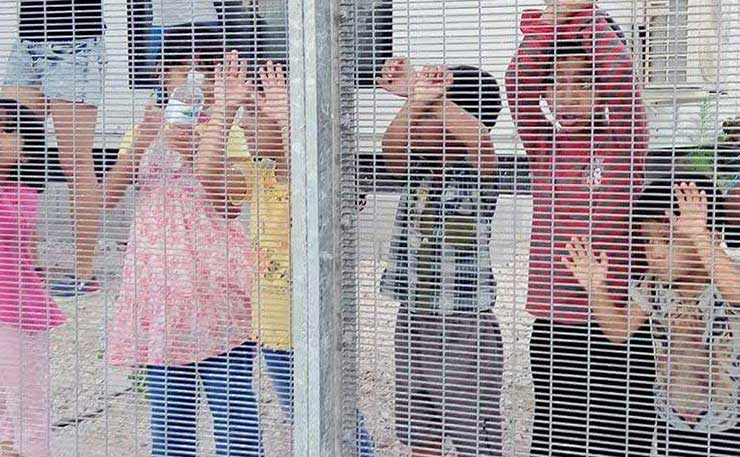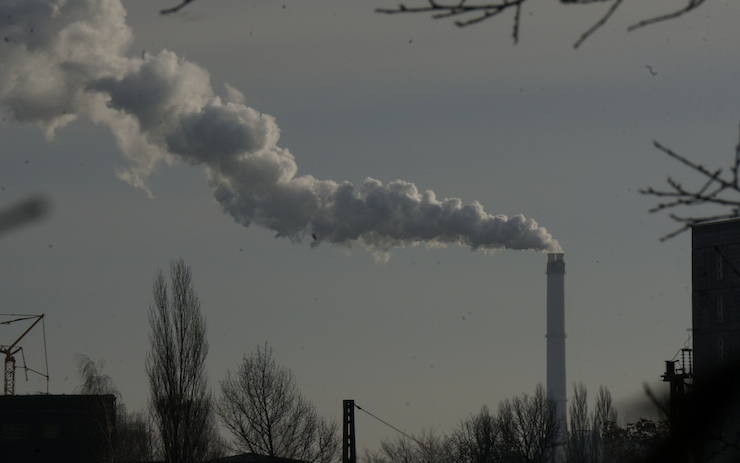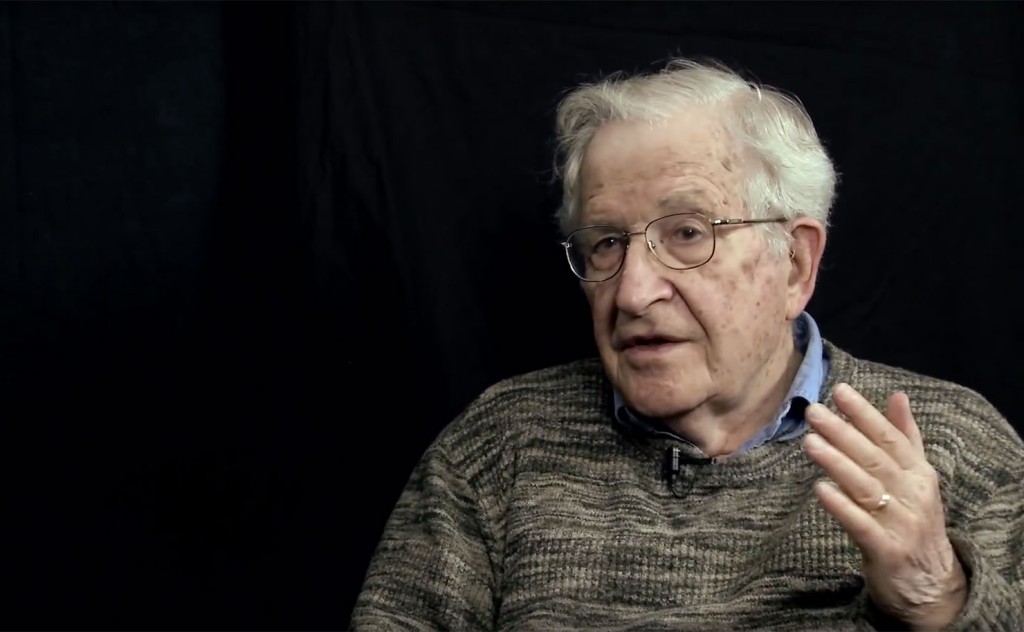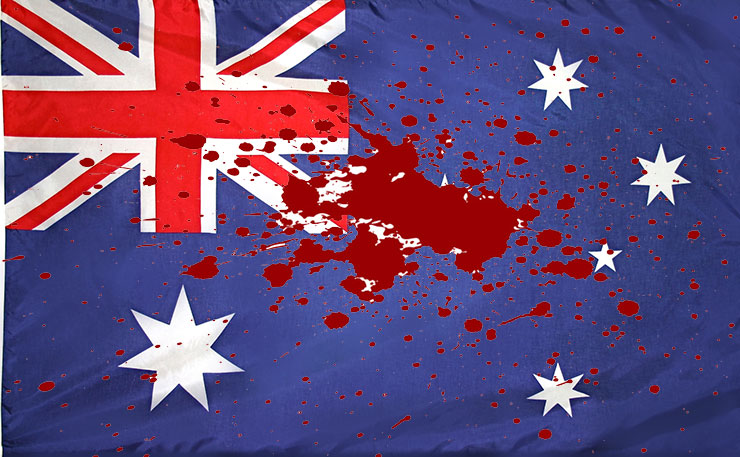If we’re going to engage in so much violence, then why not celebrate it, ask Gideon Polya and Richard Hil.
What’s all this talk about peace? Why should Australia celebrate peace when we appear to be such a violence-prone nation? Someone recently suggested that instead of staging peace rallies, Australia should hold a National Violence Day, such is this nation’s dalliance with this most aberrant of practices. No doubt, such views will upset the Pollyannas amongst us, but can Australia, in light of its past and current predilections, claim to be a peace-loving nation?
Take a look around – violence is endemic: on the telly, in the movies, in the language we use, and often in our homes and institutions. And, lest we forget, we have a very violent past: consider our First Nations people, South Sea Islanders, Chinese gold prospectors, convicts, trade unionists, women.
We remain violent towards Indigenous people, locking them up in ever greater numbers, ignoring recommendations in Royal Commission reports (as far back as 1991), denying many the basics of life, and taking away their children at alarming rates (under the justification of ‘welfare’ and ‘protection’).
But it’s not only Indigenous kids who’ve been torn away from their families over recent decades (and currently at a record rate). Consider the removal of the Forgotten Australians – half a million of them – or the thousands of unaccompanied migrant children from Britain treated so appallingly; or the many infants snatched from their impoverished mums – the so-called ‘forced adoptees’.
Many of our past and present political and economic leaders have wallowed in violence, more often than not for the most spurious and self-interested of reasons. Take today’s current crop of political chiefs. So committed are they to exporting the instruments of death and destruction, that the Coalition government has committed over $3 billion to help businesses increase arms sales around the world.
Australia’s arms exports are, we’re told, a paltry $1.5 billion per annum. We can do a lot better than that, they insist. And they’re not all that bothered about where we send these weapons.
We’ve supplied arms and equipment to some less-than-peaceful countries like Zimbabwe, Pakistan, Israel, Sri Lanka and Turkey, Indonesia, the Philippines, and more recently, Saudi Arabia – a country that breaches international law with impunity in Yemen, resulting in the deaths of tens of thousands of people through violence, war and blockade-imposed deprivation.
None of this should surprise us, as Australian governments have often turned a blind eye to violence overseas: think about the Kashmiris, the Timorese, the West Papuans, Palestinians, and the many victims of US wars.
Australia has also participated in all post-1950 US Asian wars, atrocities in which 40 million people have died from violence or war-imposed deprivation. Our violent meddling also extends to participation in illegal invasions of sovereign states, most recently Iraq, whose refugees we subsequently ban from settling here.
Talking about refugees, we have taken to locking them up on prison islands, in contravention of various international protocols, resulting in what the UN has recently referred to as “torture”. It’s not a good look. It’s what Professor Stuart Rees, founder of the Sydney Peace Foundation, refers to as “cruelty as policy” – a phrase that rings true in more than one area of government decision-making.

Australia’s dalliance with what Professor Henry Reynolds describes as “unnecessary wars” (usually on the coat tails of rapacious empires), has, in more recent times, led to the destabilisation of the Middle East, giving rise to Islamic State who are now aiming US-made weapons at the US military and their allies. Not the smartest of moves. But that doesn’t matter to us, until of course the white vans come careening down the street.
We don’t seem too perturbed either about the instability sown by the US around the world. Far from it. Australia allows the US military to locate its navy, military and spy agencies on our shores. Leaked documents from the US National Security Agency show that the Joint Defence Facility at Pine Gap near Alice Springs has provided the US military with intelligence to coordinate lethal drone attacks against targets in Pakistan, Afghanistan, Syria, Yemen and Somalia. Have we got blood on our hands? You bet.
Wars of course are at one end of the violence spectrum. As Norwegian peace scholar, Johan Galtung has noted, violence comes in many forms: from direct, physical violence through to structural and cultural violence. Structural violence refers to measures that enforce inequalities and injustices, while cultural violence legitimates these on the grounds of assumed characteristics. In other words, you don’t have to bash someone over the head to be violent. You can simply enact policies whose lived effects are harmful and frequently lethal.
It follows therefore, that government policies which, for instance, deny equal access to health care, or which increase economic inequality, or which raise pollution levels (as in Australia and elsewhere), can be regarded as violent in terms of their effects – people will suffer more and die earlier.
While the causes of many of these deaths cannot always be attributed to governments, many of them can, once the dots are joined. The intergenerational maltreatment of Indigenous people, the market conditions that lead to obesity or excessive use of alcohol or opioids cannot be easily dodged by corporate or political leaders.

The same logic applies to governments whose policies contribute to the emission of greenhouse gases. Deaths may not be the immediate effect – it takes time on a decadal scale for the deadly effects to reveal themselves – but reveal themselves they eventually do.
For instance, it’s estimated that pollutants from the burning of Australian coal exports will kill about 75,000 people annually and will increase the number of climate refugees in drought-susceptible countries, tropical island nations, and mega delta countries.
These exports will worsen an already dangerous climate which, according to Dr Andrew Glikson, an Earth and Paleoclimate scientist at the Australian National University, poses a “severe challenge to contemporary civilization”.
Dr Glikson adds that “governments world-wide (including our own) are presiding over a large-scale demise of the planetary ecosystems, which threatens to leave large parts of the Earth uninhabitable…. Time is running out: There is no Planet B”. The harm done by these governments impacts most acutely on poorer countries like Bangladesh. As Dr Atiq Rahman of the Bangladesh Centre for Advanced Studies, observes, Bangladesh is “a flat, flat, flat country. When the sea level is higher, the flow of that water will be restricted. So, when you hear now of Bangladesh being a flood-prone country – it will be a much more flood-prone country in future”.
Dr Rahman contends that the continued rates of carbon pollution in western states “makes it a huge case of moral inequality against which the global citizenry, the global nation states, must take action. If not, we’ll be calling it climatic genocide. That’s where we’re heading”.
In prosperous, liberal democratic, “fair go” Australia we all like to think the best of ourselves and our fellow citizens. However, the harsh reality is that those not supporting expertly recommended radical mitigation policies are complicit in the huge number of deaths already associated with carbon fuel burning and man-made climate change.

What is to be done? To paraphrase Professor Noam Chomsky at the Massachusetts Institute of Technology in Boston: if you want to end war or terrorism, then stop participating in it.
Australia, directly and otherwise, participates in wars that have given rise to terrorism around the world, mainly through our support of the United States which many consider to be the world’s leading sponsor of state terror.
Australia’s parliaments should be obliged to debate any proposed attack against another sovereign nation, and to question support for such on the part of a third party. Relatedly, we should all constantly question the reasons for going to war (defence of freedom, liberty, human rights, WMDs etc) and address the core justifications for doing so, which invariably involves the pursuit of markets, resources and profits.
Equally important, we should constantly question the billions of dollars devoted to “defence” and “national security” which not only divert funds from health, welfare, housing and education but can be used to mount aggressive war.
All this suggests that until a better system comes along, governments which claim to represent us need to be held fully accountable. History shows that when unimpeded, they tend toward war and violence, usually in the interests of rich and powerful.
We can’t let that continue.
Donate To New Matilda
New Matilda is a small, independent media outlet. We survive through reader contributions, and never losing a lawsuit. If you got something from this article, giving something back helps us to continue speaking truth to power. Every little bit counts.





